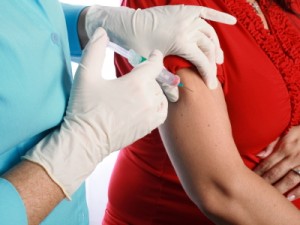Vaccination During Pregnancy
A vaccine is a product derived from an inactive or weakened micro-organism, its toxins or a component of it. It is introduced into the body to stimulate the immune system to produce antibodies that will defend the body from any attack by that particular organism. In the best case scenario, the recipient of the vaccine will be fully protected. At the very least, he or she will only suffer a milder form of the disease.
In the 18th century, an English physician, Edward Jenner, proved the value of vaccination. He inoculated his gardener’s son with pus obtained from blisters of a milkmaid who had cowpox. This resulted in the boy being protected from the much feared smallpox disease.
Ever since that experiment, vaccination has become one of the biggest success stories of modern medicine. The world of medical science has come a long way since 18th century England and vaccines today are manufactured to very high standards. They undergo stringent safety tests to conform to the requirements set by the governing health authorities. Furthermore, effective mass vaccination programs in many countries, including Malaysia, have resulted in countless of lives being saved all over the world.
Childhood immunisation is a very common practice in most countries. Nevertheless, not many are aware of the fact that vaccination can also be given during pregnancy if the benefits outweigh the risks. In situations where the possibility of exposure to a particular disease is very high and where infection will lead to complications in the mother and/or baby, vaccination may be the appropriate solution.
In Malaysia, tetanus toxoid, a vaccine aimed at preventing maternal and neonatal tetanus is the only vaccine offered during pregnancy. In government or public health clinics, first time mothers receive one dose of this vaccine during the 24th week of pregnancy. A second dose is then given about four weeks later. For future pregnancies, only one injection is given during each pregnancy period. Antibodies created by the mother will be passed on to the baby, thereby providing the child with passive immunity until a few months after birth.
Tetanus is not a problem in the more developed areas of Malaysia, where immunisation programs have been in place since the 1970’s. Girls who complete their vaccinations by Form 3 would have received at least five doses of tetanus toxoid. Immunity conferred will last 20 years, which is the duration of the female reproductive life.
Unfortunately, 90% of cases of neonatal tetanus are reported from rural or poverty stricken areas, for example in Sabah, where there are many immigrants who do not receive vaccinations. This is compounded by certain traditional practices such as applying unhygienic material to the surface of the umbilical cord of the newborn, which predisposes the child to neonatal tetanus. Consequently, the mortality rate in untreated babies is very high.
Vaccination during pregnancy can also be offered in special situations; such as during an influenza outbreak. The ‘flu vaccine’, which consists of an inactivated virus, can immunise the mother from serious medical or obstetric complications such as premature labour. Her baby will be protected as antibodies from the mother passes through the placenta. Babies infected by the influenza virus are also at a high risk of severe lung infections. In some countries where there is a ‘flu season’ such as during winter, the vaccine will be recommended during this period.
If a pregnant woman is travelling overseas, it is advisable for her to consult a doctor one to two months before the trip to discuss special concerns, precautions and vaccination, if any, that are needed. Some African countries, for example Ghana and Angola, require travelers to show evidence of yellow fever vaccination before being allowed to enter the country. Since this is a live vaccine, its use in pregnancy must be evaluated very carefully. Alternatively, travel plans can be changed.
Vaccines produced from live or weakened micro-organisms may be harmful to the baby and are usually not advised during pregnancy. They include the measles, mumps, rubella, typhoid, varicella, smallpox, oral polio and nasal spray influenza vaccines.
Following a successful pregnancy and the delivery of the baby, vaccination can be considered for mothers who are breastfeeding. According to the Center for Disease Control and Prevention in the United States (CDC) “Neither inactivated nor live-virus vaccines administered to a lactating woman can affect the safety of breastfeeding or her child.” However, the smallpox and yellow fever vaccines are not recommended for breastfeeding mothers.
Although vaccination during pregnancy is an important consideration, it is ideal to screen for immunity to certain infections (which can impact pregnancy negatively), before conceiving. Common infections that may do so include German measles (rubella virus), chicken pox (varicella virus) and Hepatitis (hepatitis B virus). The rubella and varicella viruses can cause abnormalities in the foetus. An infected non-pregnant woman can also unknowingly infect other pregnant women. Therefore, women not yet immune to these diseases should be vaccinated before pregnancy.
Some women may be a carrier of the Hepatitis B virus. In this instance, there is a high risk of transmission to the baby during delivery. In such a case, the baby will require the Hepatitis B ImunoGlobulin (HBIG) vaccine as well as the routine vaccination for Hepatitis B. Women who have given birth and have no immunity to these three viruses may be vaccinated after delivery.
In conclusion, vaccination during pregnancy is not absolutely prohibited. Any program to vaccinate the public will depend on recommendations by the relevant health authorities. In other special circumstances, the risk/benefit assessment by the doctor and the nature of the vaccine in question, whether it is derived from a live or inactivated microorganism, must also be taken into consideration. Ultimately, the goal of any vaccination program should be to prevent the onset of infectious diseases that may have devastating consequences on the mother and baby.
- Tetanus –diptheria booster
- Hepatitis A
- Hepatitis B
- Influenza (Inactived type virus)
- Pneumococcal
- Rabies
- Measles
- Mumps
- Rubella
- Typhoid
- Varicella or chicken pox
- Oral polio
This article is updated with a feature of the same topic as pubilshed in Mummy’s Secret 3 – Your comprehensive guide to a healthy pregnancy.
Written by Dr. Tan Boon Khim, Consultant, Obstetrician & Gynaecologist, Hospital Pantai Bangsar, Kuala Lumpur
Dr. Tan is a Consultant, Obstetrician & Gynaecologist with Pantai Hospital Bangsar, Kuala Lumpur. He received his undergraduate medical education in Australia at the University of New South Wales, Sydney. He subsequently trained in Obstetrics & Gynaecology in Hospital Kuala Lumpur and England where he obtained the Membership of the Royal College of Obstetrics and Gynecology (RCOG). With over 15 years of experience, Dr Tan is keen to work closely with his patients to ensure that treatment decisions are made in a collaborative manner to achieve satisfactory outcomes for their overall health. .









